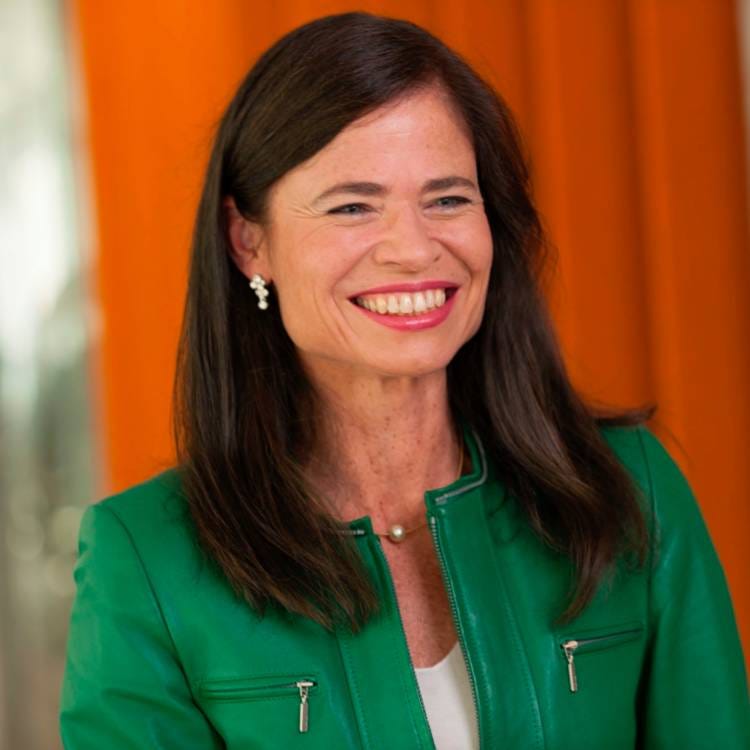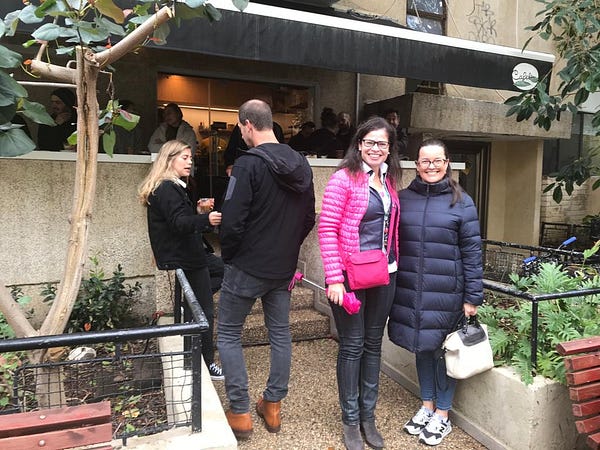being ‘cybersavvy’ is a major competitive advantage for your online company
E-resident Priya and her company Cyberconnecting OÜ are helping digital entrepreneurs move from ‘cyber lost’ to ‘cyber boss’

Editor's note: This article was originally published on 26 February 2020 then edited and re-published on 19 December 2022 to update links and information.
It seems like every day another well-known company announces that its customer data has been breached. From Facebook to the Marriott Hotel Group, Amazon, and British Airways, even multinationals with the biggest resources find it difficult to adequately protect their customers’ personal information.
So how can you — a solopreneur with far fewer resources — reassure your customers that their data is safe with you? The good news is that the steps for a small business to take are much easier to implement and maintain than it is for larger organisations. And e-resident Priya is on a mission to help equip you with the right cybersecurity tools to be cybersavvy, data-safe, and to gain a competitive advantage for your business.
Dr. Priya E. Abraham, MBA, is founder and CEO of the Estonian company Cyberconnecting OÜ, through which she offers advice and coaching to solopreneurs and small businesses about safeguarding their digital interests and cyberbrands. In keeping remote businesses cybersavvy, Priya works to change online behaviour, protect businesses, and ultimately improve the human condition.
Priya has had a fascinating and varied academic and professional career and has lived and worked in diverse locations across the world, including the US, Russia, the UK, the Middle East, and Africa. She is an anthropologist by schooling/training, an IT professional in practice, a digital entrepreneur, and a certified data protection officer.
At the intersection of her academic and business pursuits lies her e-Residency story and entrepreneurial journey. Priya’s entrepreneurial journey started in the UK, where she set up her initial company structure in 2011. However, around the time of the UK’s European Union membership referendum in 2016, Priya felt increasingly uncomfortable living and running her business there. Like many other entrepreneurs, she began looking at other options to keep her business in the EU.
Extensive research led to Priya becoming an e-resident in 2017 and registering Cyberconnecting OÜ a year later. But it has been a long and fascinating road to get there.
In airport lounges… the twain shall meet

Between 2005 and 2016, Priya worked in a dual role at a prominent business school in London, both as a professor teaching MBA classes, and as a senior programme director on large global client accounts.
Regarding the latter, her primary focus was advising on strategy, leadership, and IT-change management for large clients across the globe, such as a big telecommunications corporation based in Cairo, or a globally recognised airline brand in Europe. As an academic, Priya was interested in theoretical anthropological applications to common trends she noticed in her client-focused work. For example, how people’s identities are constructed in the physical versus the digital space, and what consequences the human element has on online behaviour.
And it was here that her seemingly opposing professional interests and identities intersected.
“Being an anthropologist and advising my corporate clients on digital transformation, I could not help but ethnographically observe and be fascinated about how these businesses and their employees operated in the digital space.”
Priya decided to use these rich sources of information to inform empirical research for her PhD. As part of her job, Priya travelled frequently, and therefore spent a lot of time waiting for flights in airport lounges. She spent this time converting her fieldwork observations into her written PhD dissertation.
Priya’s core PhD research found that identity constructions can be packaged into twelve elements — four visible/tangible elements (supporting stereotypes) and eight intangible elements. These elements largely define our behaviour both in the physical space and the way people present themselves in cyberspace, confirming that user behaviours play a key role in the digital environment. People have coexisting, multifaceted, and overlapping identities. Identity is never static; rather, it constantly evolves.
Priya’s findings have been published in several formats, including in academic books and journals.
You can find summaries of her findings as well as a wealth of other information and resources on the Cyberconnecting blog.
From cyber lost to cyber boss
While at that time Priya’s combination of academic and professional pursuits, specifically anthropology and IT, appeared unusual, she had a hunch that the impending rise of digital industries would ensure that her research would become highly useful in the future.
And did it ever.
Her unique know-how has led to her becoming an expert in topics at the natural interplay of technology and society, including digital identities and user behaviours, privacy, cybersecurity, and data protection, and a well-known and regarded adviser to business on the implications on their cyberbrands of how humans use digital services.
Humans are the weakest links when it comes to cyberthreats, data breaches, and online invasions of privacy. This is despite the fact that there is ample information available for people to understand the risks posed in the online realm. For example, humans still use easy passwords like ‘password’ or ‘12345’, a fact that is easily abused by threat actors. Perhaps surprisingly, this carelessness is not limited to personal accounts but even to business owners and administrators as well!
The gap between what people understand they need to do and what they actually do is a problem and one that Priya tries to address through her work. She does so by encouraging a human-centric approach to technology.
This means using technology to change people’s behaviour, which subsequently improves data security. This in turn helps companies maximise their innovation potential and also has wider reaching effects. For example, a human-centric approach to technology normalises privacy as a human right, thereby improving the human condition.
Essentially, if people within an organisation can transform from being cyber lost to being a cyber boss, this can provide a competitive advantage to their business as well.
Priya’s e-book, Your Cyberpower. How to Safeguard Your Remote Business and accompanying online training package for business provides more detailed information on these issues as well as tips on how to align human identity elements with your cyberbrand.
How e-Residency helped keep Priya’s business in the EU after Brexit
Priya’s entrepreneurial journey started in the UK, where she set up her initial company structure in 2011. However, around the time of the UK’s European Union membership referendum on 23 June 2016 and the rise of xenophobia in the UK, Priya felt increasingly uncomfortable living and running her business there.
While she hoped that Brexit might stop, she decided to leave the UK and take her business to the EU because of the uncertainty Brexit generated around politics, business, and migration. This time was especially disruptive to her life and her career and she took some time to research and decide where to base herself and her business.
Around this time Priya saw an advertisement on Twitter for e-Residency. With her background and without knowing much about Estonia’s digital infrastructure and capabilities, she was intrigued but also cautious. But once a contact at Europol reassured her that the programme was legitimate and trustworthy, she decided to look into it seriously.
Priya started investigating the programme. She asked for advice from the e-Residency team, who provided her with useful information and guidance in incorporating her business.
“The application process went smoothly and quickly. I experienced no complications and received the email confirming that my kit was ready to be picked up at the Embassy in less than the standard quoted time.”
Priya picked up her e-Residency kit in 2017 and set about incorporating Cyberconnecting OÜ in the following year.
Priya’s Estonian company was initially the home for her digital services book, online course, and business coaching services for solopreneurs and small to medium businesses.
Over time, Priya has built up Cyberconnecting's package of services and now offers:
- high-end, semi-automated advisory services for business leaders to help develop and execute their digital strategy to increase profits;
- creating thriving company culture (VAELIOU); and
- an interactive cyberpower programme for solopreneurs, startup founders, and SME owners to help them implement cybersecurity and privacy in their success growth strategy.
Not just a cyber boss but a privacy boss as well
In addition to her expertise in cybersecurity, Priya has also gained DPO certification for the EU General Data Protection Regulation (GDPR).
In all her work, she assists clients in creating a data privacy culture, fundamental to gain advantage over competitors. The current GDPR services Priya provides to her clients are semi-automated.
Priya’s vision for e-Residency and Estonia relates to her expertise and the fact that the country is already a digital leader nation in the EU with regards to cybersecurity and digital services.
In her view, a natural next step is for the digital nation to become as world renowned for its expertise in privacy as it is already for cybersecurity. At a time when the GDPR is the gold standard for privacy and data regulations worldwide, Estonia has a great opportunity to be the EU representative for GDPR compliance and the gateway for non-EU businesses and people outside the EU to be GDPR compliant too. Added to this, if the California Privacy Act (which is like the GDPR in many respects) gains further traction in the US, there might be additional reasons for Estonia to consider such a strategy.
Identifying as an e-Estonian

Since setting up her Estonian company, Priya has made several trips to Estonia. During her first trip in 2018, she absolutely fell in love with the country, particularly with the charming, straightforward people and the burgeoning startup culture. She stayed at Draper House (formerly Tribe Theory Hostel) in Tallinn, where she met other like-minded startup entrepreneurs and got her first taste of the innovative business environment.
Several visits later, and Priya has built a network of meaningful connections with startup entrepreneurs and digital nomads, engaged with and learned from founders, investors, and others in the burgeoning Estonian startup ecosystem, and utilised well-known coworking spaces and all of the additional services offered.
Priya has also become familiar with the whole of Estonia; not just Tallinn but also the smaller cities and villages, and the nation’s natural wonders like the bogs, forests, and lakes as well.
“I feel that Tallinn/Estonia is an excellent place for digital nomads and other location independent entrepreneurs, because public transport works flawlessly, people largely speak English and Russian (in addition to Estonian), and it is safe for solo travellers, especially important for women like me.”
All in all, Priya considers that being an e-resident provides an additional identity characteristic to her portfolio, both tangibly and intangibly. She is proud of her connection to the most forward EU digital nation and sometimes even introduces herself as an e-Estonian.
